|
The importance of a Festival.
Artists coming from all over the world attend to Festivals
and allow them to compare their work and to affirm the importance
of a language meant (maint) to reach perhaps one day the
"Total Art' we dream of for centuries, listening to the
critic René Déroudille from Lyon, who died 3 years
ago.
To built a Festival, and I'm talking about a subject I know well,
is one of the thing the most chalenging and hard at the same
time that I've ever been able to know.
Challenging because the result of all this huge energy allow
to reach the crystallisation which can only be if a dense artistic
concentration take place on a length of at least one week.
This state favours not only meetings between artists and various
participants in the event, but allows also, of course, to exchange
ideas, projects plans, analyses and reflections of a situation
and all this can only promote and develop this positive force
that is proper to all gathering of persons engaged in the same
interests and attracting mixed audience.
The crucial choice of the Polysonneries Festival to allow these
meetings was made knowingly with the detriment of a more reasonable
budgetary heading involving less risks.
As Pierre Restany underlines it, who supported with Orlan and
Nicholas Zurbrugg, the first edition of the Polysonneries Festival,
"the essential character of the performance, that is to
say its interactivity dimension, has made of Performance an open
space to collective expression and to dialog and information.
The interactive dimension of performance takes a social value
of particular importance. After having exploited the politics,
religion and sport in their qualities of collective entertainment
and management, societies seek more and more into art to help
filling up cultural and human free times. Development of Performance
in occidental and industrialized countries as well as in the
peripheries of the world, foresees the answer that art can give
to this social demand more and more explicit. Concerning this
subject, the Festival of Lyon takes the value of an alert and
of a recall to the order of collective communication interactivity
".
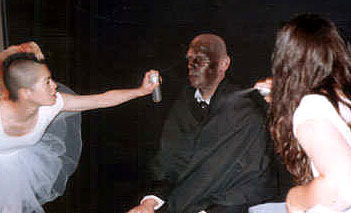 R. Vaara R. Vaara
In addition to the well-known and recognised performers, the
other interest of these festivals is the discovery - and the
confrontation -- of some performers emerging out of the beaten
paths. Whether it is by their strong presence, their brilliant
ideas, the derision of which they make evidence, or the tact
with which they touch the subconscious of their victims, their
performances let suppose a perfect control of themselves and
the great rigour of their artistic education. Among these "transmitters
of signs of humanity ", Sylvie Cotton in Quebec and Myriam
Laplante which lives now in Italy, the Finish Roi Vaara, the
Slovak Lengow & Hermes (Michael Murin & Joszef Czeres),
the American and theorician Coco Fusco, the Mexican Lorena Wolffer,
the Americans Dan McKereghan, Jeffery Byrd, Derek Horton... and
many of the young artists to be followed closely.
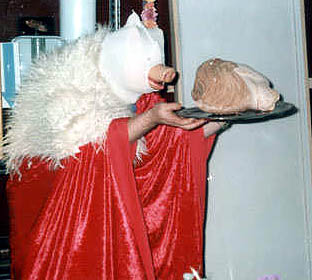 D. Horton D. Horton
The FUTURE
I really think that Art develops our capacity to understand
ourselves and of course the world.
Today's current unsteadiness, recent catastrophic criminal attempts,
former and present wars of course, opulence and obsessive over-consumption
influence artists, especially those of performance, who get their
inspiration out of social, of political problems to feed up the
collective consciousness of nowadays.
Besides the fact that Performance is not sustained in our occidental
countries, one can even state a real will to keep it as unobtrusive
as possible.
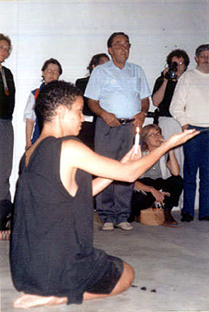 C. Fusco, PFO,
DK, 1999. C. Fusco, PFO,
DK, 1999.
So, disturbing Performance?
Anyway, it finds itself reduced to a forced discretion caused
by the lack of financial means necessary to his promoting and
to a communication able to touch a broader audience.
In France, the pedagogic approach around this field is certainly
not tackled by Fine Arts Schools.
Performance refuses to enter into a commercial system and that
offers no aura in the opinion of contractors of this mercantile
society always more interested by benefit.
Performance resists to all fashion phenomenon and that only offers
a small media echoes back.
The liberty of this artistic form of art therefore takes a cardinal
importance and we should all be aware so as to protect its
existence.
To the word "barometer", it would be of a good taste
to add the term of "counter balance", necessary to
our current society.
There is no use to revitalise Performance Art because this discipline
continues existing and developing all around the world. Let's
just drive in the nail. For each event, a wider audience
takes part, also often discover this artistic discipline and
appreciate it. Full Nelson Festival in Los Angeles 2002 organised
by Jamie Mac Murry gathered at the least 250 persons in a downtown
theatre. It seems obvious that we are not talking about any ghetto
here.
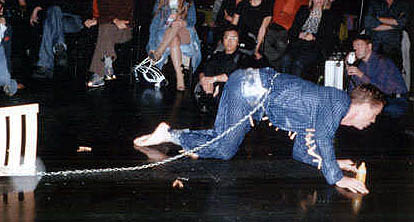 McMurry, festival
Amorph 01, finland McMurry, festival
Amorph 01, finland
This form of active resistance has always disturbed because
it uncovers things one prefers to ignore. Its main quality (among
others) would be its independence. And doesn't one always pay
in return for its independence?
Then let me inform you about the new Association of the International
Performance Art Organizers (IAPAO, www iapao.net), which was
created in Essen (Germany) during the 11th conference of Performance
Art organized by Boris Nieslony in April 2003. IAPAO is a gigantic
central of information about performance art , IAPAO is a network
that promotes and supports performance art activities and research.
The next meeting will take place this year in Indonesia.
I just want to point out the great work made in Quebec by
le Lieu of which journal's Inter is an unfailing spring of indications
about Performance. The hudge wroten work (500 pages), entitled
"Art Action from 1958 to 1998" covers 4 decades of
artistic practices in the action field.
I can also quote the research work undertaken by Boris Nieslony
in Germany and that can be seen on the site: www asa.de
And let you know that the Contemporary Arts Fund of Corsica bought
a performance by Akenaton in 1998. It is a great first time as
far as I know.
Finally I am myself preparing a book. This work will consider
my point of view on current international performance art, not
only through the Polysonneries Festival but also thanks to all
the journeys I could make throughout the world and the research
and archives I constituted around this artistic discipline.
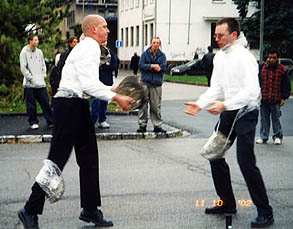
Polysonneries today
For the year 2003, because of the lack of involvement of the
City of Lyon and local Ministry of culture, it is with a certain
bitterness that the Festival Polysonneries, considering the state
of the financial commitments of its various partners, has been
obliged by regulation to return the European grant. One must
consider the fact that the local support is obligatory for a
European grant.
What an incredible waste, without even taking into account the
work already done, to prepare the 2003 edition, at a pure loss!
Which, among other things, foresaw close collaboration with the
Academy of Fine Arts of Helsinki, Finland, in conjunction with
the FRAME (Finish Fund for Art Exchange) and with the Echevinat
of Ixelles in Brussels. The Festival should also have taken place
in these 2 countries.
The result is afflicting!
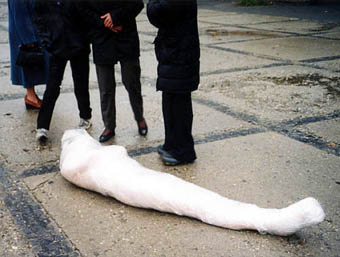
How does one resolves without bitterness the loss of one of
the rare places of discovery and confrontation dedicated to Performance
Art and the authentic creativity it engenders? How does one envisage
the activity of the organisers of such events linked to similar
domains if they can, from one year to another, be completely
questioned, which bars any long term strategy and forbids as
well all risk taken as research and audacity which are necessary
in such cases?
Is it necessary to remember that in 1979 the Symposium of Performance
Art formed the basis for the current Polysonneries?
Why, here in Lyon, is there no wish to support independent structures,
who work in the multidisciplinary sector to which official speeches
today pay continual lip service? Why, with each change of local
government, is the future of such manifestations questioned?
Are we eternally condemned a precarious situation, subject
to the tantrums or the incomprehension of one or other official
or politician?
More generally: should we resign ourselves to the fact that the
end of the Polysonneries signifies regression and at the same
time, an acceleration of the process that brings us closer to
the non sharing reign of commercial and spectacular culture :
catholic tradition, institution and show business apparently
welded together and reacting in unison to liquidate liberal space
essential to life.
The situation is serious, we must react !
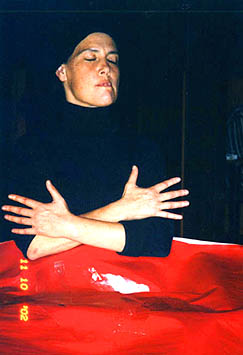
For my part, I can announce right now that, considering the
conservatism of the cultural politic of the Lyon's City Hall,
the Polysonneries Festival will not occur soon in Lyon. On the
other hand, in 2005, several serious collaborations' projects
are taking form with several cities and within the framework
of prestigious events in France.
Pass the word!
Sylvie Ferré
|
|